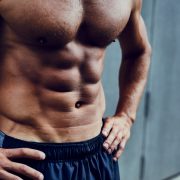
The right exercise programme and diet go hand-in-hand when it comes to getting a six-pack. If you sweat it out at the gym every day, but don’t get the right nutrition or adopt the correct nutritional principles, you won’t see much results. The same principles apply when you are trying to get a sick-pack by simply eating right, but avoiding exercise. Either way, there are no shortcuts.
Here are some nutritional tips to pair with your exercise programme:
Cut back
Generally, a good rule of thumb is to cut back on sugar, simple carbs (like bread and pasta), fried foods and alcohol. Replace them with vegetables, lean proteins, foods rich in healthy fats (like avocado and nuts), and wholegrains as well as pulses.
Protein
Build your diet around your protein intake. Your metabolism breaks down more calories breaking down protein than it does other foods. It also helps you fuel your muscles when getting fit, which raises your metabolism and helps you burn fat more efficiently. Opt for protein such as:
- Lean chicken breasts,
- Hard-boiled eggs, and
- Fish such as tuna, salmon and/or mackerel. (Just as an aside, besides being a great source of protein oily fish is also a wonderful source of essential fatty acids.
WATER, WATER, WATER
Water will always be a key element of ANY fitness plan or diet. Not convinced?
The benefit of water is that it keeps you hydrated, it also helps keeps you full and flushes out excess sodium to prevent bloating.
So drink up!
Some athletes choose to hydrate with sports drinks as well as these contain essential electrolytes that are lost during training and sporting events. However, what must be noted is that these drinks also contain a higher number of calories than water does so if you do decide to drink sports drinks make sure that you actually do need them.
Keep on eating
Sometimes, people think the easiest choice for losing weight is to stop eating. They cannot be more wrong!
Hunger raises your levels of stress related hormone cortisol, which contributes to weight gain. It can also slow your metabolism and dampen your energy levels. The reason for why you put on weight when you starve yourself is that when you deny your body food you’re effectively telling your body that there is no food available and that it needs to hold onto any nutrients that it can.
This means that you will find it harder to lose weight than if you’re eating small, frequent meals. If you’re eating the right foods, regular meals and snacks will keep your body fuelled. Eat low GI meals so that your stomach feels that it’s fuller for longer so preventing you from eating more than you should.
Fibre
No, not the Internet connection… High-in-fibre foods keep you fuller with fewer calories. It also keeps your digestive system working at its best and helps maintain healthy blood sugar levels.
Are you not sure what foods are high in fibre content? Try berries, fruits, roasted vegetables, beans and whole-grain bread.
Yoghurt (and other fermented foods)
Fermented foods contain probiotics, the healthy bacteria that lives in your gut and helps reduce belly fat.
Eating calcium-rich dairy foods also increases overall weight loss.
What to include in your diet
- Broccoli
- Cinnamon
- Cheddar
- Mushrooms
- Sweet Potatoes
- Apples
- Green tea
- Chilli peppers
- Blueberries
- Grapefruit
- Milk
- Oats
- Oranges
- Walnuts
- Salmon
What about snacks?
A very unhealthy habit when watching television or sitting at your desk, whether you are working or studying, can be snacking.
But don’t fret. You don’t have to stop.
Try replacing your daily snacks with healthy alternatives. For example, replace crisps with nuts, which provide healthy fats and many essential trace minerals.
Correct nutrition plays a huge role in sculpting a six-pack. When you exercise without the right diet, your six-pack often gets lost under a layer of fat. In order to lose that layer, you need to get the right nutrition. Proteins, dairy and fibres are a yes. Carbs, sugars and alcohol are a no-no.
